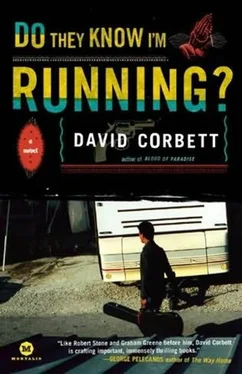Lattimore felt vaguely backdoored. The bureaucratic merry-go-round in this thing was already mind-numbing. Beyond the guys on the ground in Iraq whom this McIlvaine bird had already mentioned, there was the counterterrorism desk in Washington, the Transnational Anti-Gang Task Force in Los Angeles, and outside the bureau he’d had to involve ICE on the immigration angle-without a significant public benefit parole, Happy Orantes would get grabbed right out of Lattimore’s office and deported so fast his head would spin, no matter what he had to say or who he had to offer. Then there was Homeland Security’s inspector general on the corrupt border agent angle, and if they decided to pass-he was still waiting for an answer-it would be back to ICE, their office of professional responsibility. And then there was the Pentagon, the NSA, even the OGA/CIA, who’d be tracking the cousin Roque through his cell phone and informing trusted local contacts in Mexico and Central America of his whereabouts in case something went sideways. The State Department insisted on notification too, since they were permitting known criminals to enter a sovereign ally, and most likely they’d inform the MFJP, the Mexican Federal Judicial Police, the gold standard for south-of-the-border corruption, something to put off as long as possible.
He felt his cell phone vibrate in his breast pocket, pulled it out. A text: “All OK.” He dropped the phone back in his pocket.
“So then, Mr. McIlvaine-”
“Andy. Please.”
“What can I do for you?”
The bristly face rubbered up another butterscotch smile, further skewing his glasses. He fussed again with his briefcase clasp, rummaged about inside, finally extracting a thin sheaf of papers. With no more exertion than that, a bead of perspiration formed in the hollow of his temple, hanging there, a minor defiance of gravity. “This may still be making its way to your desk.” He leaned forward, holding the documents out. “I thought I might facilitate.”
Taking the papers, Lattimore noticed the cover sheet bore no agency heading or seal, just a line at the top for subject reference-in this instance, the name Samir Khalid Sadiq-then another line for the date, a third bearing a source code he couldn’t decipher. He pictured the original gathering dust on somebody’s desk in Baghdad. Typical, he thought, and yet the poverty of detail on the face sheet suggested clandestine channels, spooks in the ether, dead drops. OGA. How many lies would he have to sit through, he wondered, if he asked Mr. Itchy Teeter-Peepers how he got his hands on the thing?
The second page was in Arabic, the third a translation. It appeared to be a data sheet of some sort, for an employee, a contact, maybe the target of an inquiry. Lattimore’s eye, trailing across the page at random, quickly settled on the word “Mukhabarat.”
“You may or may not know this,” McIlvaine ventured, the lone bead of sweat still hovering at eye level. “Forgive me if I’m belaboring the obvious. After the fall of Baghdad, coalition forces took control of various government ministries, including the Mukhabarat, Saddam’s secret police. By the time they arrived, unfortunately, many of the files had been destroyed in the invasion’s first wave of bombings. Most of the rest were boxed up by loyalists and hustled away or carted off by looters. In the weeks after Baghdad fell, some files resurfaced, many of them ransomed off to the families of men who had disappeared. Some were sold to journalists-it was practically a cottage industry. It’s difficult to know the value of what remained. This, for example.” He wiggled his hand at the sheaf of papers. “Your man Samir was on the payroll, that much appears certain. What does it mean? He may have been an interpreter through the foreign press office or a minder for a foreign journalist. They may have enlisted him as an informer, they kept a close eye on the Palestinians in-country. Or he could have been nothing more than a driver for one of the car companies the Mukhabarat operated.” He shrugged, then crossed his legs, revealing a bright hairless shin above the bunched gray sock. “Maybe he collected payoffs. Maybe he was an assassin. Maybe this document is fake.”
Lattimore had to resist an impulse to reach over and wipe the drop of sweat away, maybe straighten the man’s glasses while he was at it. He handed the papers back. “You came all the way from Dallas to tell me that?”
McIlvaine’s smile turned sly. “A link to the Mukhabarat is, of course, inherently significant. Top to bottom-analysts, case agents, drivers, torturers, common thugs-they were jobless after Baghdad fell. Many went to the Americans hoping for a job and got brushed off. That left the resistance, which they flocked to, angry, humiliated, out of work, but also well informed and lavishly armed since neither the Third Army nor the First Marines were assigned to guard the weapons depots.”
Lattimore studied the man’s eyes, which had hardened almost imperceptibly behind the old-fashioned lenses. Anyone who’d served in uniform couldn’t look at that war and not turn bitter at the recklessness, the idiocy, the arrogance. But that wasn’t quite relevant to the matter at hand. “The fact we can’t be sure exactly who this man is as yet,” he said carefully, “argues for the greater control we can exert by keeping tabs on him, which this investigation does. What would you rather have us do, let him move at will?”
Another smile from McIlvaine, less sly than indulgent. “We’ve learned Mr. Sadiq was sponsored by a prominent Salvadoran of Palestinian descent for his visa, not someone we know, exactly, but a friend of a friend, let’s say, two or three degrees removed from people we trust. That doesn’t mean he’s a genius or a saint but he’s on our side, as far as we can tell.”
“Let me stop you for a second. Tell me again, this is all of interest to you why?”
“To be honest, I thought the more relevant issue would be its interest to you.”
“My interest is obvious. Yours-”
“As I said, this is my area of expertise. I work in the private sector. When you have the fee structure we do, you’d better know your business. We can’t wait to educate ourselves as circumstances dictate. We’re paid to predict, not react.”
“What concerns me,” Lattimore said, “is why my business is your business.”
“Mr. Sadiq is my business. Any potential threat in the region is. Now, may I continue?”
Lattimore felt outmaneuvered. Still, better to see where the thing was heading.
McIlvaine toggled his glasses. “Where was I? Yes, a foreign affairs officer from the embassy followed up-our embassy, down there, in Santa Elena. The sponsor said he was asked to back Samir because he’d helped the Salvadoran troops in Najaf. That’s all he knew. He preferred not to say who asked him to step up for the sponsorship but claimed it was absolutely not someone who would knowingly get involved in a plot to move a terrorist across three borders into the States.”
Lattimore marveled at the scant reassurance the word “knowingly” provided. Given the capacity for ignorant blundering you saw everywhere, Iraq most of all, what difference did it make what you knew or intended? Still, despite the sense of being outflanked, he took some relief from McIlvaine’s news. It basically confirmed Happy’s version of events.
“El Salvador,” McIlvaine continued, “is relatively enlightened on immigration issues, curiously enough. During World War II, the Salvadoran embassy in Geneva issued citizenship papers to more than forty thousand Hungarian Jews. Of course, most didn’t emigrate. But the citizenship documents kept them from being deported to the camps.” He drummed his fingers on his briefcase. “The curse of all intelligence analysts: I’m a history buff.”
Читать дальше












